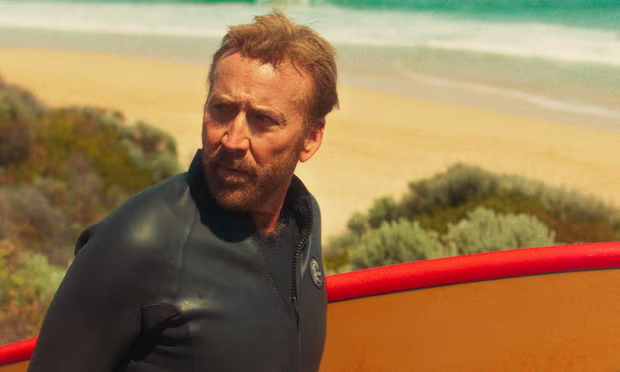An office drone must suffer the machismo of an Australian coastal town in this barmy, low-budget thriller about a would-be wave-chaser

Here is a gloriously demented B-movie thriller about a middle-aged man who wants to ride a big wave and the grinning local bullies who regard the beach as home soil. “Don’t live here, don’t surf here,” they shout at any luckless tourist who dares to visit picturesque Lunar Bay on Australia’s south-western coast, where the land is heavy with heat and colour. Tempers are fraying; it’s a hundred degrees in the shade. The picture crash-lands at the Cannes film festival like a wild-eyed, brawling drunk.
The middle-aged man is unnamed, so let’s call him Nic Cage. Lorcan Finnegan’s film, after all, is as much about Cage – his image, his career history, his acting pyrotechnics – as it is about surfing or the illusory concept of home. The Surfer sets the star up as a man on the edge – a sad-sack office drone who desperately wants to belong – and then shoves him unceremoniously clear over the cliff-edge. Before long, our hero is living out of his car in the parking lot near the dunes, drinking from puddles, foraging for food from bins, and scheming all the while to make his way down to the shore.
Nobody wants him. His desperation is pathetic. He’s a little like the character that Burt Lancaster played in The Swimmer, if Lancaster had been regularly beaten up by his neighbours and occasionally crapped on by parrots. Also, if Lancaster’s role had been performed by Cage.
“I thought you were an American,” a passing photographer remarks at one point, which provides the convenient prompt for the hero to explain that he was born in Australia before moving to California as a kid, which is presumably why his accent sounds exactly like that of Nic Cage.
He has a dream of buying a house on Clifftop Drive and of riding the waves on his board every morning, except that the man is fooling no one. He is an unwelcome outsider and therefore counts as fair game.
As his humiliations pile up, Cage rises brilliantly to the challenge, cranking the acting dial from befuddled to vexed to outraged to volcanic. The effort is such that one half-fears for his safety. The man’s face is so red you could practically fry an egg on his forehead.
“Before you can surf you must suffer,” says Scally (Julian McMahon), the alpha male ringleader of the bullies on the beach; he has the smile of a great white shark and a weekday gig as a corporate raider. It’s a line that serves as a mantra for the Lunar Beach Boys, with their hazing rituals and toxic masculinity, although conceivably it may also be referencing Cage, an actor who tends to break himself down in order to build himself up, who likes to foster the impression that he’s constantly on the verge of wiping out. If Cage’s hero is going down, one assumes it won’t be without a fight. If he somehow manages to win through, his victory will surely come at an enormous personal cost. All the poor man wants to do is surf. But first he must suffer, and few performers do it better.
Crisply scripted by Thomas Martin and directed by Finnegan with a pleasing, no-frills intensity, The Surfer feels resolutely old-school. It’s a low-budget, hard-hitting comic bruiser of a picture: a midlife-crisis movie dressed up as a 1970s exploitation flick.
Finnegan’s film premieres in the rambunctious midnight screening slot at Cannes. That’s probably the right call, given its wild, roiling, hallucinogenic vibe, although I wonder if the festival selectors might have missed a trick. They ought to have screened The Surfer on the beach for the locals. They could have put all the critics behind cordons and made them watch the film from afar.





